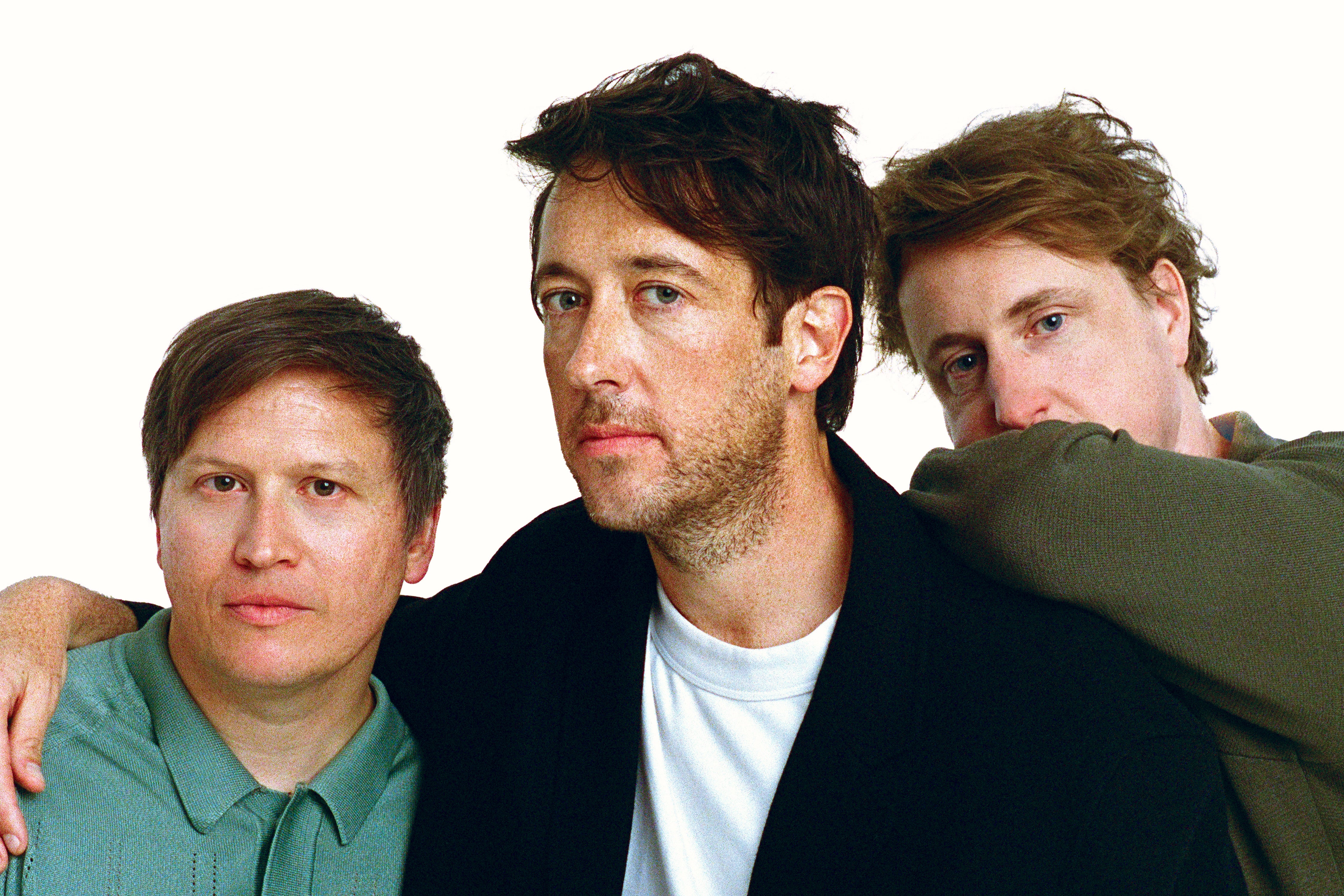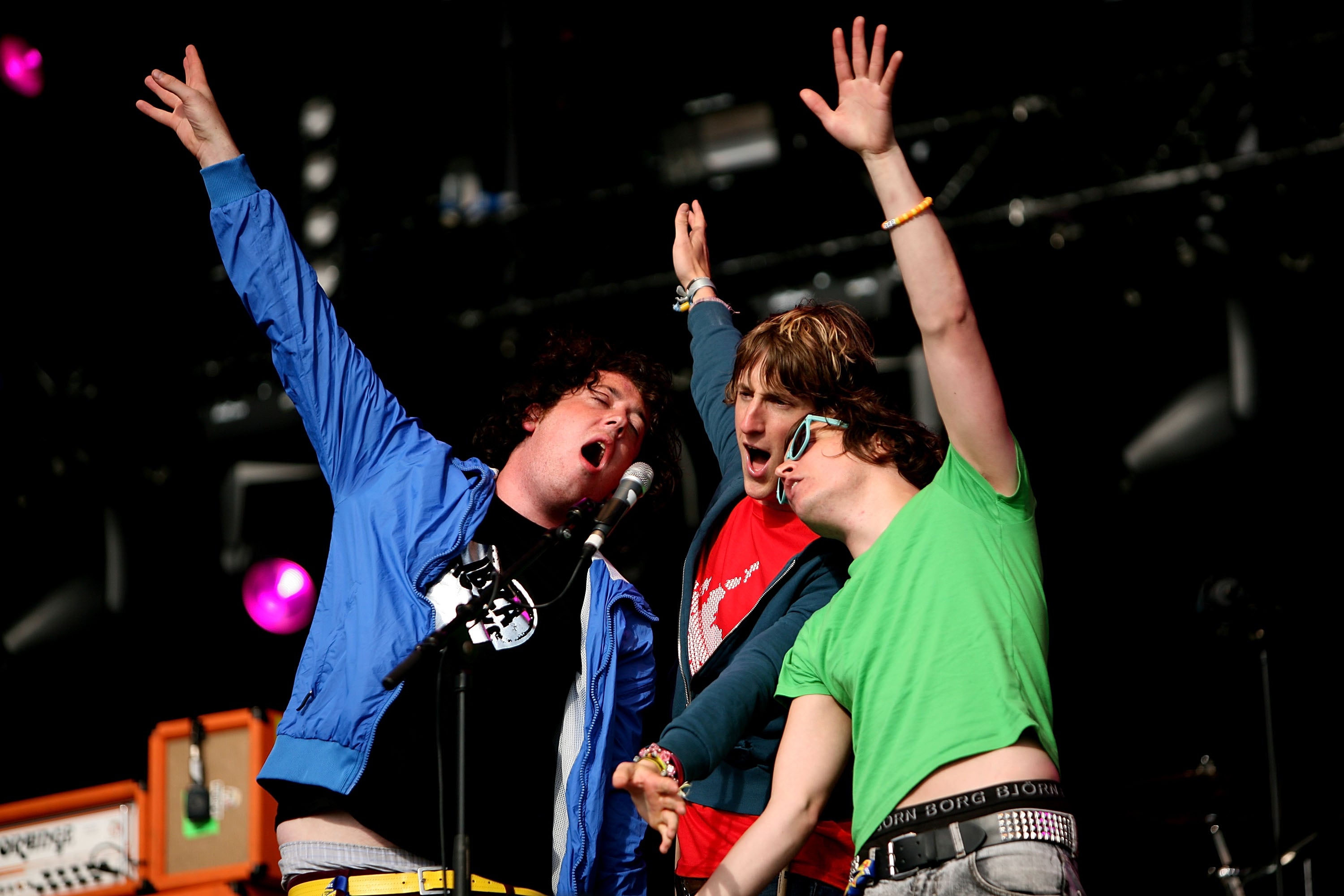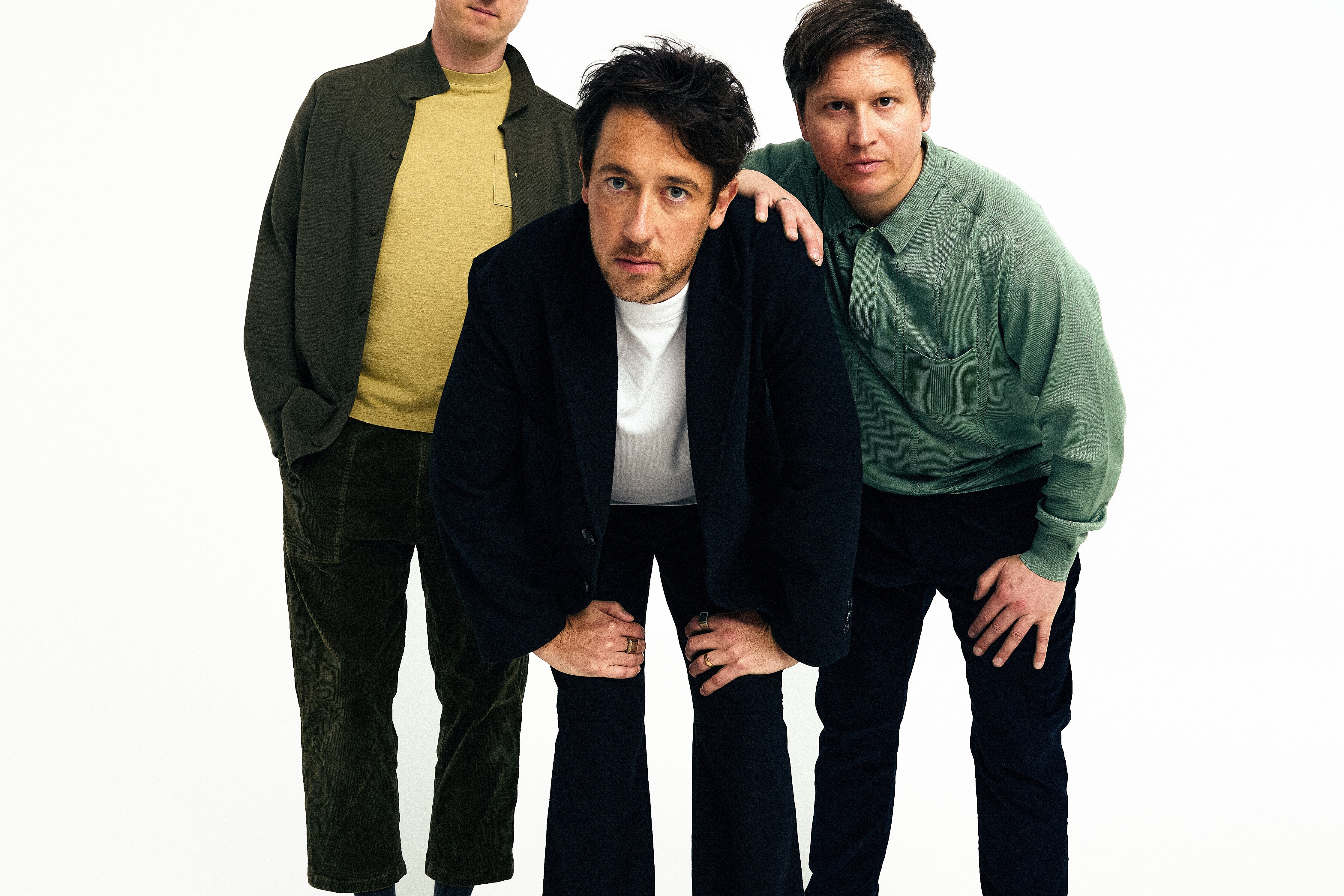
Here he comes now, dashing between the twinkling fairy lights, chic bars and Harry Potter stores of Liverpool’s Albert Dock towards our coffee shop date, that forgotten ex who waltzed back onto our timelines looking more and more like The One that got away. Back then, almost 20 years ago now, Matthew “Murph” Murphy was the anxiety-riddled frontman of cartoonish indie-pop trio The Wombats, bouncing around 2007 entreating us to dancefloor catharsis in “Let’s Dance to Joy Division” where “everything is going wrong but we’re so happy!” It might have felt like a delirious but brief fling for many, but in the intervening years, and over five hit albums, Murph’s band have become TikTok sensations, Gen Z heroes, a streaming phenomenon, chart-topping arena stars. Why the hell not give him a second chance?
As he bustles into the bar, impeccably turned out in boho overcoat and rockstar shirt, the green flags stack up. Though tousled and tired from a week of intense rehearsals with his bandmates Dan Haggis (drums) and Tord Øverland Knudsen (bass), Murphy’s small talk is friendly and tea-ful. There’s a dash of nostalgia at being back in his home city, where The Wombats have convened from homes in the US, Norway and Liverpool to perfect songs from their new sixth album Oh! The Ocean for a forthcoming arena tour. He reminisces about how one emotional Valentine’s Day massacre in his youth inspired the band’s debut single and first Top 20 hit “Moving to New York”. His date declined further drinks in favour of an early night, only for Murph to later spot her in a Liverpool bar “murdered off her face”. “She was s***faced and making out with someone,” he says, baggage long since shed. “I got really jealous and wrote that song.”
His thoughts, though, are still on his adopted hometown of LA where, until recently, he lived just a mile-and-a-half east of the Palisades fire. “There’s, like, ready… set… go,” he explains. “We were on ‘set…’, but we didn’t wait for the evacuation order. We just left because the air quality was f***ed.” Murph was lucky, but he knows three people who lost their homes. What struck him most, though, was the fact that his local charity shops were so overwhelmed with donations that they had to start turning donors away. “That’s a good metaphor for Angelenos in general. Everyone’s a bit caught up in themselves and maybe not very grounded as a community of people, but hearts of gold.”
As we relax into our mineral waters and chicken goujons, the guard begins to come down. Gradually, we unravel Murph’s recent transformation from anxious, addiction-twisted hot mess baring his breakdowns, paranoias, romantic failures, narcotic habits and marital rows on albums such as 2022’s No 1 Fix Yourself, Not the World to the more sober and philosophical Murph we find staring out to sea contemplating existence on Oh! The Ocean. Here, amid much rich and futuristic sonic evolution with new producer John Congleton (of Death Cab for Cutie and St Vincent fame), tracks such as “The World’s Not Out to Get Me, I Am”, the happy/sad “Gut Punch” and the fatalistic “Grim Reaper” seem to look upon Murph’s personal turmoils from a better place than before, one of acceptance of life’s ups and downs.

The title was inspired by an epiphany Murph experienced on a Californian beach holiday with his wife, Akemi, and their young family last year. “I was very sleep deprived and I was looking out at the ocean, and the feeling was like, ‘What is the nature of nature?’,” he says. He realised right there that he’d been too wrapped up in himself for too long, numbed to reality by the “false energy” of touring life and his own protective, enclosing mindset. “I didn’t want to deal with the sharp edges of life,” he says. “I think of the bandwidth of life now – I’d just squashed it so that the highs weren’t too high and the lows weren’t too low… every day was pretty much the same day.”
By then this one-time intoxicant obsessive was already solidly sober; now he feels rejuvenated too. “I’m actually enjoying life again,” he says, smiling. “I’m not clouded. I’m not trying to put something between me and life any more. I feel like I popped my head above the clouds.”
And what dark clouds they were. The band’s 2007 debut album A Guide to Love, Loss & Desperation made light indie-pop work of Murph’s anxiety issues and relationship disasters; dumped on the dancefloor, lovesick at the forest rave, betrayed on Valentine’s Day. “Let’s Dance to Joy Division”, the album’s biggest hit, celebrated how misery and ecstasy could coexist in the troubled young mind, a dichotomy that has come to define the band.
As their sound gradually expanded in synth-rock and mainstream pop directions, laying the groundwork for modern alternative pop and becoming increasingly popular with each new generation of young pop fans (their 2015 album track “Greek Tragedy”, a viral TikTok smash several times over, has racked up around 300 million streams across its various versions alone), Murph’s confessions grew ever more visceral and cathartic. The 2011 ballad “Anti-D” explored his addiction to anti-depressant medication. Tracks like “This Is Not a Party” (“It’s a hurricane”) and “Out of My Head” found him indulging his hedonistic streak to self-destructive and brain-cracking degrees: by 2018’s “Turn” he was singing about “seeing a message flash and then smashing up my phone” and “screaming at the moon in black lipstick”. And the obsessions, letdowns and car arguments of “Lemon to a Knife Fight” and “If You Ever Leave, I’m Coming with You” were Kardashian-level insights into the rollercoaster of married life, episodes in a sonic Meet the Murphys that you were always amazed to find had made it to another season.
Whether it was with alcohol, drugs or anything, I just like to do everything full bore, 150 per cent and with no balance
Was Murph crying for help through the tongue in his cheek? It seems so. “Whether it was with alcohol, drugs or anything, I just like to do everything full bore, 150 per cent and with no balance,” he confesses. His intake issues came to a head one summer when he was splitting new fatherhood in LA with rock’n’roll festival jaunts to Europe. “I think I did 22 transatlantic flights in, like, 50 days. That was when it really got out of control.”
He also admits to “two or three” serious meltdowns, the worst after their major label (prematurely, in hindsight) dropped the band after 2015’s third album Glitterbug. “My ego took it really hard, and I just went into a tailspin over the course of a few weeks,” he says. A friend stepped in to get him the very best in psychiatric help. “He spoke to The Rolling Stones’ doctor, who fast-tracked me in to see the number two psychiatrist in the UK in Windsor. I went in there, I spoke to him for an hour or two. It was mad. There were lots of bankers in this place and they were still working.” Ultimately, though, it was driving to Manchester that night and playing a gig which fixed him up. “I remember saying to Dan and Tord, ‘I don’t think I’m gonna get through the show,’” he says, ruefully popping a halloumi bite. “But the gig was what sorted me out… the feeling of just being with my friends on stage. I wasn’t by myself in my own head any more. I was with them and with the crowd, and I kinda got out of myself, and that was what I needed.”
For all its therapeutic intent and attempts at post-traumatic equilibrium, Oh! The Ocean is still wracked with some of the issues that Mick Jagger’s shrink has yet to scalpel from his psyche, largely about being his own worst enemy. “Can’t Say No” addresses his irresistible urge to follow suggestions, no matter how wild and inadvisable: car theft, cemetery parties, far east voyages, summoning demons (of which he’ll admit only to a drinking session at Jim Morrison’s grave in Paris). “I have fleeting moments of feeling content, which I never had before,” he says, “but they’re still interspersed with a lot of, ‘Come on, let’s f***ing go’… I still feel like I want to escape. I want to either switch my brain off or toss myself in the Albert Dock, or whatever.”
“My Head Is Not My Friend” throws back to regretful hangovers of old, with their black spots full of cancellation fears and shame. And first single “Sorry I’m Late, I Didn’t Want to Come” concerns his antisocial awkwardness on the LA party scene. “I’ve never been a good socialite,” he grins, safe in the knowledge he won’t be named in any P Diddy lawsuits. Having been prone to drowning his nerves to scene-causing degrees in his drinking days, he now steers clear of A-list shindigs. “They are ridiculous – everyone is painfully good looking and it can be quite shocking at first. And then some people are just weird and cool and off the wall, and some people are really trying to climb the status hierarchy. It’s hard to differentiate who is who.”

Having dished some gossip about the real-life neighbours whose divorces, breakdowns and Lactating Mommy OnlyFans accounts are detailed in “Kate Moss” (“My wife is like, ‘When our friends hear that, you’ve put yourself and me in a really weird position again. Can you please stop doing this?’”), we set about putting the world to rights. When Murph first wrote a song called “I Love America and She Hates Me”, it was intended to both lampoon gun culture but also balance the pros and cons of LA’s go-getter mindset. “It’s made me 10 per cent more productive, 10 per cent happier,” he claims. “It’s hyper-competitive but also very supportive.”
As it approaches release, though, it’s becoming ever more pertinent. As with all Valentine 2025 dates, talk turns to Trump. “I’m a bit worried about these whopping great tariffs that I think he’s just done so people come to the table and want to cut a deal with him,” Murph says, ducking around the topic with impeccable expat tact. “If they don’t then it could backfire. But I’m very much like, ‘touch some grass, don’t watch MSNBC, and don’t get up in arms’, because what he says and what he does are pretty different.”

A viral success story on the site himself, Murph is well placed to dissect the impact of a looming TikTok ban. “Some great stuff has come out of TikTok,” he considers, “but it can promote artists that either don’t have that much substance or don’t know what they’re doing yet, because things can happen so fast.” The result, he feels, is an increasingly brutal pump-and-dump culture; our timelines clogged with musical crypto scams. “It just seems like another way to send someone up to the moon and then f***ing lob them back down, which is not good for the creative soul. I’m very lucky that it was always a slow gradient upwards [for us]. It was never an ‘up to the moon’ and then you’ve got to figure out how you can live on the moon for the rest of your life.”
And The Wombats might as well have been living, growing and headlining arenas on the moon for the past 15 years or so, as far as their less clued-up critics are concerned. Does Murph often meet people completely unaware of how big they are now? “Yeah, all the time,” he laughs. “The amount of people I’ve met who remember a song that was on The Inbetweeners and then say, ‘Well, what happened to you guys? Where did you go? Are you still making music?’ And I’m just like, ‘I’m on f***ing album six, and we’ve literally just done thousands of shows non-stop’.” Turns out, all along, The Wombats ticked all the boxes. Murph is a real keeper.
‘Oh! The Ocean’, the new album by The Wombats, is out on Friday







